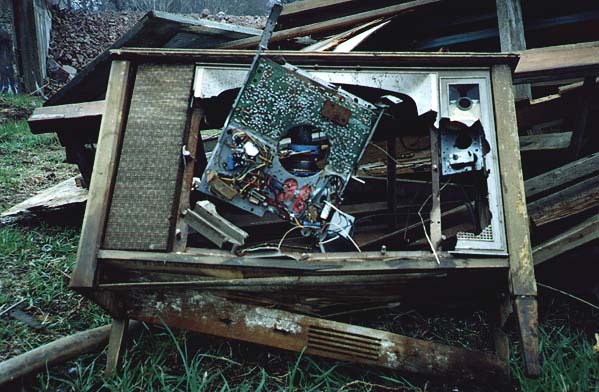Disturbing Days for Search and Seizure Protections

Photo Courtesy of http://www.thelionhearted.org
It's bad enough to read that this is how the U.S. Supreme Court is taking the law of search and seizure generally. The new opinion, Hudson v. Michigan, apparently calls into question any continuing validity of the exclusionary rule. Justice Scalia wrote the opinion on behalf of a 5-4 majority, including all who you'd expect would fall among the five.
For a quasi-lawyerly perspective, here is ABA Journal's take on it.
NY Times Supreme Court reporter Linda Greenhouse made this interesting observation of Justice Scalia's opinion:
It is rare to find Justice Scalia, a self-described "originalist," incorporating evolving conditions into his constitutional analysis. Almost always, when the court in a constitutional case takes account
of changing conditions, the result is an expansion of constitutional rights, rather than, as Justice Scalia advocated in this case, a contraction.
With this opinion, and his vote in last term's Medical Marijuana case, which turned on a thoroughly Un - Original view of the Commerce Clause, Scalia appears to be tossing aside his legal purity in favor of convenient means to legalistic ends. I guess we'll have to see how else this will shake out ...
Justice Breyer wrote the dissent, joined by Justices Stevens, Ginsburg, and Souter, noting that, "the court destroys the strongest legal incentive to comply with the Constitution's knock-and-announce requirement. And the court does so without significant support in precedent."
I guess all that stuff Justices Roberts and Alito said about their obligation to stare decisis was like so much other chaff to throw off the radar.
The NY Times Editorial Board picked up on this theme, making it one of their themes of outrage in today's lead editorial:
If Justice Sandra Day O'Connor had stayed on the court, this case might well have come out the other way. For those who worry that Chief Justice John Roberts and Justice Samuel Alito will take the court in a radically conservative direction, it is sobering how easily the majority tossed aside a principle that traces back to 13th-century Britain, and a legal doctrine that dates to 1914, to let the government invade people's homes.
Note this fun fact that appears to have alluded all of us but this regular DailyKos poster:
This week marked the 40th anniversary of one of the most famous Supreme Court decisions ever handed down. It's the only decision I know of that has worked its way into American popular culture. I've heard that two billion people worldwide know about Miranda and that even small children are able to recite the Miranda warnings from memory.
What a lovely irony! As a tip-of-the-hat to history, five members of the Supreme Court's right wing agreed to cut the meaning of the Exclusionary Rule to pieces where the objectionably-obtained evidence is hidden behind a door.
The Miranda opinion may remain a classic in the view of the pop legal world, but the 1966 opinion's precedential value is clearly on the wane. As a note, Lexis-Nexis lists the case with a red flag, meaning its holdings have been overturned or otherwise undercut as to its enforceability. In Miranda's case, a federal statute (18 U.S.C. § 3501) has since created a test for weighing a statement's voluntariness that has replaced Miranda's stricter standard.
The Hudson decision clearly continues the general assault on Miranda-type protections against illegal searches and seizures. That is, if we assume that Justice Kennedy's concurrence doesn't undercut the precedential value of the Scalia opinion. For whatever it's worth, Justice Kennedy wrote:
… the continued operation of the exclusionary rule, as settled and defined by our precedents, is not in doubt. Today's decision determines only that in the specific context of the knock-and-announce requirement, a violation is not sufficiently related to the later discovery of evidence to justify suppression.

Photo courtesy of The Washington Post / http://www.washingtonpost.com
But then he adds:
In this case the relevant evidence was discovered not because of a failure to knock-and-announce, but because of a subsequent search pursuant to a lawful warrant.
I struggle to see the distinction. Moreover, I have a hard time following the distinctions made by Justice Scalia – particularly those with the Court's unanimous 1995 opinion in Wilson v. Arkansas, in which Justice Thomas (that's right – that Justice Thomas) wrote:
Given the longstanding common-law endorsement of the practice of announcement, we have little doubt that the Framers of the Fourth Amendment thought that the method of an officer's entry into a dwelling was among the factors to be considered in assessing the reasonableness of a search or seizure.
Justice Scalia, it came down to considerations that hardly jive with his Originalist legal philosophy, which would appear to require application of the Bill of Rights' drafters' view of impermissible search and seizure. For Justice Scalia yesterday, it was all about the discretion and enforceability of the standard for courts:
Unlike the warrant or Miranda requirements, compliance with which is readily determined (either there was or was not a warrant; either the Miranda warning was given, or it was not), what constituted a 'reasonable wait time' in a particular case … (or, for that matter, how many seconds the police in fact waited), or whether there was 'reasonable suspicion' of the sort that would invoke the Richards exceptions, is difficult for the trial court to determine and even more difficult for an appellate court to review.
Maybe these distinctions will soon become the stuff of pop culture, "The Mod Squad," and familiarity to children.
Don't hold your breath.
Speedway Tim notes:
I think it is Scalia's contempt for American civil rights that annoys me. It's not just that he's a hypocrite who favors a strange (to me) version of federalism, who thinks the Constitution should be viewed through the prism of 1920s Catholicism, and who favors the powerful over the rest of us.
Many people, especially powerful people believe that. It's the contempt he imposes upon anyone with any idea from the New Deal on that I object to.
I would love to get his personal opinion of Brown v Board of Education. I don't think Scalia's a racist, mind you; I just don't think he cares.
A fair enough analysis, prediction.
Meanwhile, elsewhere in the ugly world of improper search and seizure tactics ...
Photo courtesy of http://www,andrew.cmu.edu
The Village Soup also recently reported this ugly story about sketchy search and seizure practices in connection with alleged eco-terrorists in Maine. Here's the Press Herald's take. This must be coming to the fore as planners ramp up for the Plum Creek development showdown at Moosehead Lake and the next round of battles over a proposed liquefied natural gas terminal Downeast. As one commenter told Village Soup:
"I would never advise anybody to voluntarily give DNA samples to police, because you don’t know what kind of database it’s going into or what it will be used for … There are shades of J. Edgar Hoover in this episode."
Ironically, the stepped-up state anti-eco-terrorism efforts come as the anti-development movement
appears to be making headway. Here's the Natural Resource Council of Maine's view.
Similarly, the Bangor Daily News reports that "it is not a foregone conclusion that any liquefied natural gas terminals will be constructed in the state."

Photo Courtesy of http://www.mooseheadcabins.com
Here is Earth! First's view of the Plum, well 'Scum' Creek plan in its own words: " The scumbags spearheading the Moosehead Lake development are backslapping with as many town managers, businessmen and school officials as possible, striving to pull the wool over as many eyes as they can." Who says objective journalism is dead?

%20MARCH.jpg)

































